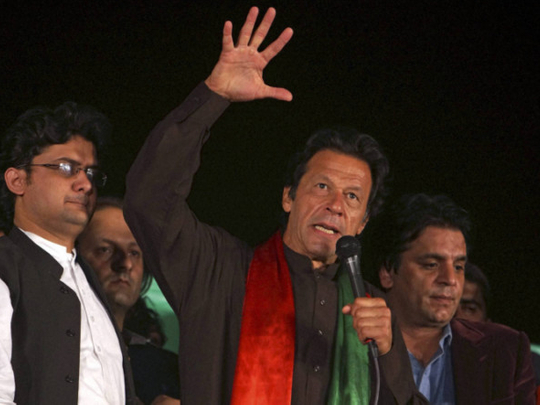
The crowds of protesters outside Pakistan’s parliament have indeed thinned out from their peak just a few weeks ago, bringing a bit of badly needed good news for Prime Minister Nawaz Sharif’s beleaguered government. But is this a matter of a sustainable relief for a government that has largely squandered its time in office so far? To that obvious question, the answer must be in the non-affirmative looking at the regime’s unimpressive promise since Sharif was elected for the third time in the summer of 2013.
Tahir-ul-Qadri, a firebrand but moderate Islamic cleric, has indeed stepped back from the high point of his anti-government protests. For the moment, he has departed for the comfort of North America, leaving behind a once charged-up but now visibly demoralised group of followers. Though Qadri has promised to return later this month, scepticism over his ability to dent Sharif and his regime is scattered all around. Given that this is the second time that Qadri has retreated after promising to lead a revolution, it is clear that he will need a lot more than just his oratorical skills to inspire his followers should he return to Islamabad again.
This leaves cricketing legend Imran Khan and his followers from the Pakistan Tehreek-e-Insaf (PTI) or Pakistan Justice Movement to take the anti-Sharif battle forward, but on their own. PTI’s band of protesters are camped out for now across the road from Pakistan’s parliamentary building in Islamabad. Though Imran has promised to unleash the final push in his campaign against Sharif from November 30 onwards, the outcome of the movement is yet to be seen.
Meanwhile, an unexpected piece of good news has come in the shape of a noticeable cut in domestic fuel prices — thanks to global trends. For Pakistan’s economically deprived population, this indeed marks a rare bit of welcome news in a country where popular outcry surrounding inflation remains unending.
And last but not the least, the Pakistan army, which has ruled the country in the past, so far appears to be maintaining its neutrality. The widely discussed possibility of a coup in the making just a few weeks ago has proven to be nothing more than a fly in the ointment, given that General Raheel Sharif, the Army Chief-of-Staff, is clearly determined to keep his troops in their barracks and away from politics.
However, for Sharif, all these pointers of good news so far give little indication of a sustainable turnaround — either for the largely beleaguered regime of the ruling Pakistan Muslim League-Nawaz (PML-N) or indeed for the country itself. The message from the accountant-turned-finance czar, Ishaq Dar, the Finance Minister, ad nauseam speaks of an emerging hope for better days. On the face of it, the optimism is seemingly built around an array of new infrastructure projects that have appeared on the horizon, in addition to the response from international markets to a couple of offers of Pakistan’s bonds. But clearly, if the finance guru understood the economics of a challenged country like Pakistan, he would have also had his priorities right. Resetting Pakistan’s direction must begin with tackling challenges such as dealing with a pathetically underperforming tax collection system that stands at the heart of many of the country’s ailments.
There are just too many individuals and too many lobbies at work that continue to blatantly rip off the country. In recent months, cases of members of parliament who neither pay their taxes nor are prepared to reveal their scale of wealth have been reported across Pakistan. But there has been virtually no effort in the parliament to discuss this issue with a view to reforming the systemic failure where it matters the most — around the ruling elites themselves.
Indeed, a yawning gap in the ruling structure’s view of Pakistan is a complete failure to respond immediately to the matter of abject and widespread poverty scattered all around the country. There are multiple unresolved issues on this front that are not easy to sort out through short-term measures.
For instance, a largely dilapidated state-run education system essentially means that the poorest of the poor will not be able to send their children to school. Consequently, a continuing challenge of widespread illiteracy or semi-literacy will also continue to fuel poverty in the coming years. Meanwhile, the oft-repeated joke about Pakistan’s government-run health care facilities says much about their continued underperformance. ‘If you want to get sick, go to a hospital’, goes the jibe. Eventually, these matters are far more important than the continuing obsession by the ruling class to oversee construction of fancy new roads or other transport projects.
But more than just a policy shift, a re-focus on the right set of priorities requires a shift in the mindset. Going forward, these gaps not only threaten Pakistan on a continuing basis, given their ability to continue destabilising the country. Indeed, such gaps will also continue to feed in to any political narrative built against Pakistan’s ruling class.
In this background, Qadri or Imran may or may not succeed in bringing down the ruling structure. And yet, it is more important to recognise where the discontent is stemming from rather than to remain obsessed with one set of dissident leaders after another. In today’s policy environment in Islamabad, Pakistan is far from safe, even if the latest challenge to confront Sharif’s government may have subsided for the moment.
Farhan Bokhari is a Pakistan-based commentator who writes on political and economic matters.












